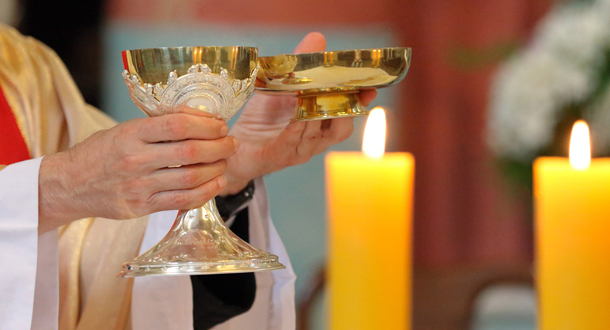 Scripture:
Scripture:
1 Corinthians 11:17-26, 33
Luke 7:1-10
Reflection
We receive the body of Christ in order to be the body of Christ.
This metaphor for the church originated with the apostle Paul in his first letter to the Corinthians. To speak of the church as a body suggests unity, togetherness, and harmony. We imagine a vibrant community where everyone shares their talents and resources generously and joyfully, encouraging and supporting one another as together they further Christ’s work in the world.
But that was not happening in Corinth at all. Ironically, Paul’s most original theology of the church developed in response to a grievous problem. The Corinthian church could not be Christ’s body for anyone because they were a fractured and divided community, one marked more by conflict, animosity, and discord than harmony and peace. Today’s first reading is the earliest account in the New Testament of how the first Christians worshiped. As the passage illustrates, they gathered in one another’s homes where they would share a meal together. Bread would be blessed, broken, and distributed, and a cup of wine would be shared. In this way, the unity, charity, and peace they had together in Christ was meant to lead to unity, charity, and peace among themselves.
Paul is angry with this fledgling Christian community (“What can I say to you? Shall I praise you?”) because the factions among them, rather than being healed when they celebrated the Lord’s supper, only grew more prominent; indeed, their “meetings are doing more harm than good.” When they gather, those who have more, thinking only of themselves, share nothing with those who have little; thus, the poor, left out and overlooked, are shamed. Moreover, some are getting drunk at a meal that ought to be marked by reverence and thanksgiving, not thoughtless self-indulgence.
In stark contrast to this unsettling portrait of the early church is today’s passage from the Gospel of Luke. The centurion addresses Jesus with the words we reprise at every Eucharist: “Lord,…I am not worthy to have you enter under my roof.” Like the church at Corinth, if we are to be Christ’s body in the world, we must first receive Christ’s body with the humility, sincerity, and truthfulness that Jesus encountered in this memorable Roman soldier, the very one he holds up for us as an exemplary model of faith.
Paul J. Wadell is Professor of Theology and Religious Studies at St. Norbert College in De Pere, Wisconsin, and a member of the extended Passionist family.
